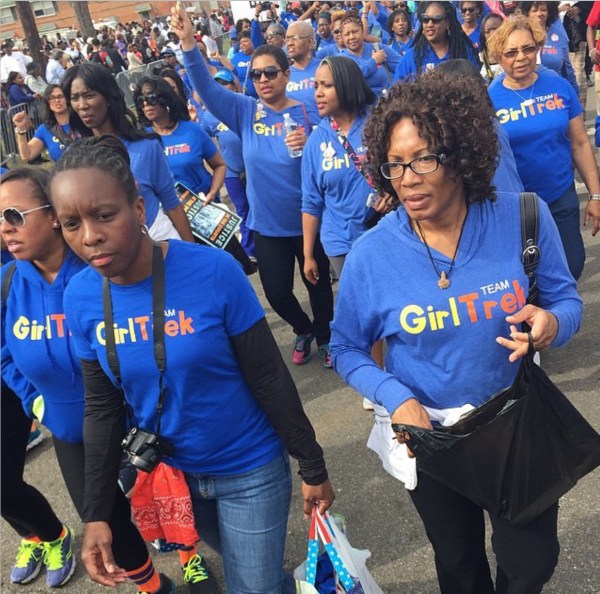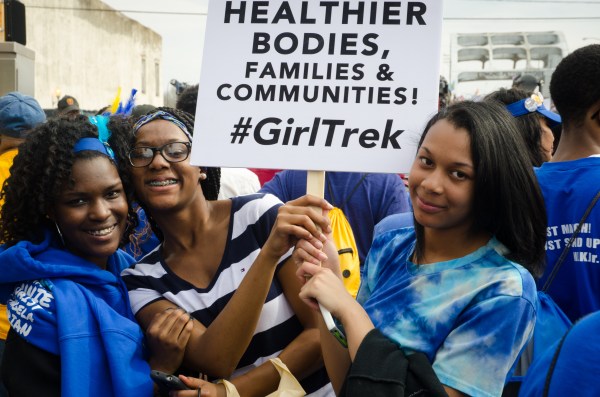A new generation is inspired to serve as health activists and stewards of neighborhoods and parks.
Every day, thousands of women and girls in neighborhoods across the country lace up their sneakers and walk outside with an organization called GirlTrek. They walk to heal their bodies, inspire their families and to reclaim the streets of their neighborhoods.
Exactly one week ago, in the basement of a historic Black church in Birmingham, Alabama, GirlTrek’s national team stuffed 500 burlap bags. The bags included clipboards, Rosie the Riveter buttons, packets of hot chocolate and many other reminders for the busloads of women and girls headed their way that building a grassroots movement takes organization, fortitude and self-care.
In 24 hours flat, buses from Detroit, Chicago, New Orleans and St. Louis were completely booked. Within days, there was not a seat left on the 10-city caravan to the epic celebration of the 50th Anniversary of the Selma-to-Montgomery March. In the end, 500 women and girls would stand on the front lines of history with GirlTrek. They left the iconic Edmund Pettus Bridge energized to do the work of THIS generation—to serve as healthy role models in their neighborhoods by creating the habit of walking and falling in love again with the natural environment.
Black women are dying younger and at higher rates than any other group of women in the country from preventable diseases such as diabetes, stroke and heart disease. Eighty percent of Black women are over a healthy body weight and fifty percent are morbidly obese. We carry the weight of broken communities, ceaseless caregiving responsibilities and sensible indicators that systemic change is out of reach. The root causes of our health condition is many-fold: Chronic stress, lack of healthy food options, unsafe streets and, frankly, diminished willpower—willpower tarnished by the images and memories of resolute mothers and daughters being met by fire hoses.
Charting a path forward is not easy.
When the First Lady of the United States, the National Park Service, REI, and leading health institution, The Robert Wood Johnson Foundation, supported this tiny nonprofit called GirlTrek, they never could have imagined its impact. GirlTrek is an inspiring campaign with a daily call-to-action for those at greatest health risk to fight for their lives.
GirlTrek has already inspired some 28,000 women to lace up their sneakers and get active. It’s a viable solution to the health crisis in America, a crisis that disproportionately lives and breathes in African-American homes and communities.
If we can rally those in greatest need to stand up, like Selma we can inspire a nation to change. Thousands of women and girls have signed on to do just that. Together, we stand up as healthy role models in our families. Together, we establish keystone habits of healthy living—like getting sunshine everyday on brisk neighborhood walks. Together, we serve as stewards of the natural environment by protecting urban green space and planting trees to make neighborhoods more walkable.
GirlTrek supporter Cheryl Dorsey, president of Echoing Green, an organization that identifies the top 1% of social innovators in the world, gave a toast to the women of GirlTrek saying, “In the footsteps of a Civil Rights legacy, GirlTrek is re-establishing walking as a transformative tradition in Black communities.”
I doubt that even Cheryl could imagine what happened last week.
We actually walked in those footsteps…a brisk morning walk to the 16th Street Baptist Church where a bomb killed four little Black girls as they readied themselves for Sunday school. The tragedy moved President John F. Kennedy to take action. We walked to the historic Carver Theater, the only movie and concert house that allowed African-American patrons. There on the marquee was the celebratory message, “GirlTrek: Reclaiming our Streets!” And on the morning of Bloody Sunday, we rose at 5am to get a jumpstart on an epic tribute: We walked in the very footsteps of giants: Dr. King, James Bevel, Amelia Boynton—the women and men who put feet to their prayers and walked for what they believed in. It’s what GirlTrek does everyday; we step out on faith that a culture of wellness and healthy traditions are not only possible, but within reach.
While our grandmothers and grandfathers carried signs demanding freedom, voting rights and equality, our signs championed new traditions, healthy neighborhoods and self-care.
This was—by far—the most historic Civil Rights celebration in the country, #Selma50.

And we were there.

We left, more determined than ever to live our healthiest, most-fulfilled lives.
Photo credit: Bree Gant and T. Morgan Dixon, (c) GirlTrek 2015
